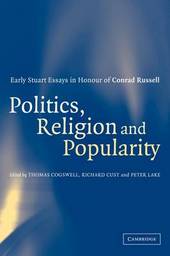
|
Politics, Religion and Popularity in Early Stuart Britain: Essays in Honour of Conrad Russell
Paperback / softback
Main Details
| Title |
Politics, Religion and Popularity in Early Stuart Britain: Essays in Honour of Conrad Russell
|
| Authors and Contributors |
Edited by Thomas Cogswell
|
|
Edited by Richard Cust
|
|
Edited by Peter Lake
|
| Physical Properties |
| Format:Paperback / softback | | Pages:316 | | Dimensions(mm): Height 229,Width 152 |
|
| Category/Genre | British and Irish History
History of religion |
|---|
| ISBN/Barcode |
9780521188821
|
| Classifications | Dewey:941.06 |
|---|
| Audience | | Postgraduate, Research & Scholarly | |
|---|
| Illustrations |
Worked examples or Exercises
|
|
Publishing Details |
| Publisher |
Cambridge University Press
|
| Imprint |
Cambridge University Press
|
| Publication Date |
3 March 2011 |
| Publication Country |
United Kingdom
|
Description
Revisionism has had a far-reaching impact upon the history of politics and religion in early Stuart Britain. The essays collected here were originally published in 2002, and set out to assess this impact and develop further some of the central themes highlighted in the work of the historian Conrad Russell, and address a series of themes arising out of recent debates on the causes of the English Civil War. The subject-matter ranges from high-political narrative to the study of rumour, gossip, and print culture. Topics covered include the character of Charles I's kingship, the place of Parliament in the political system, the divisive legacy of the English Reformation, and the problems posed by trying to unite England with Scotland and Ireland. The collection will interest readers concerned with the political and religious history, and also the literature, of early seventeenth-century Britain.
ReviewsReview of the hardback: '... remarkable and unusual tribute to a great historian ...' History Review of the hardback: '... a beautiful piece of historical narrative ... this volume not only acknowledges Conrad Russell's influence on those now working in early Stuart studies, it also demonstrates the continuing fecundity of early Stuart Britain as a field of historical research.' Royal Stuart Review
|